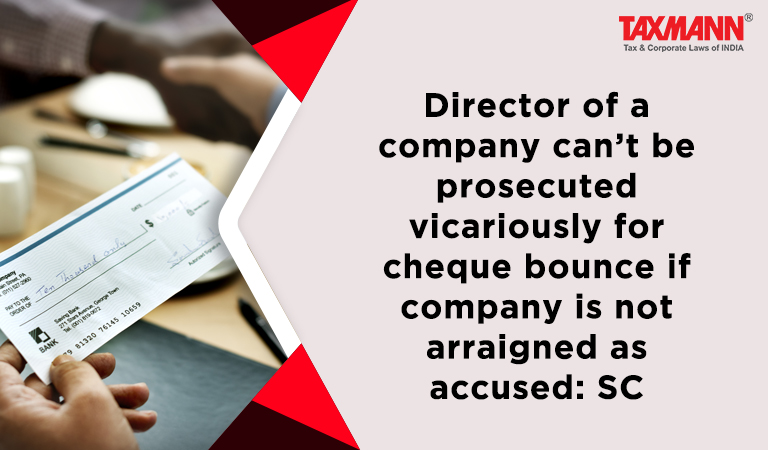Director of a company can’t be prosecuted vicariously for cheque bounce if company is not arraigned as accused: SC
- Blog|News|FEMA & Banking|
- 2 Min Read
- By Taxmann
- |
- Last Updated on 21 November, 2022

Case Details: Pawan Kumar Goel v. State of U.P. - [2022] 145 taxmann.com 57 (SC)
Judiciary and Counsel Details
-
- Krishna Murari & Bela M. Trivedi, JJ.
Facts of the Case
In the instant case, the following two main issues arose before the Apex Court:
(1) Whether a director of a company would be liable for prosecution under Section 138 of NI Act without the company being arraigned as an accused?
(2) Whether a complaint under Section 138 of NI Act would be liable to be proceeded against the director of the company without their being any averments in the complaint that the director arrayed as an accused was in charge of and responsible for the conduct and business of the company?
Supreme Court Held
The Apex Court held as under:
The provisions of Section 141 of the NI Act impose vicarious liability by deeming fiction which pre-supposes and requires the commission of the offence by the company or firm. Therefore, unless the company or firm has committed the offence as a principal accused, the persons mentioned in sub-Section (1) and (2) of section 141 would not be liable to be convicted on the basis of the principles of vicarious liability.
For maintaining the prosecution under Section 141 of NI Act, arraigning of the company as an accused is imperative and non-impleadment of the company would be fatal for the complaint.
Arguments advanced by learned counsel for the appellant that an additional accused can be impleaded subsequent to the filing of the complaint merits no consideration, once the limitation prescribed for taking cognizance of the offence under Section 142 of NI Act has expired.
More particularly, in view of the fact that neither any effort was made by the petitioner at any stage of the proceedings to arraign the company as an accused nor any such circumstances or reason has been pointed out to enable the Court to exercise the power conferred by proviso to Section 142, to condone the delay for not making the complaint within the prescribed period of limitation.
Vicarious liability of a person for being prosecuted for an offence committed under the Act by a company arises if at the material time he was in charge of and was also responsible to the company for the conduct of its business. Simply because a person is a director of a company, it does not necessarily mean that he fulfils both the above requirements so as to make him liable. Conversely, without being a director a person can be in charge of and responsible to the company for the conduct of its business.
Where the allegations in the complaint did not in express words or with reference to the allegations contained therein make out a case that at the time of commission of the offence, the individual named in the complaint as accused was in charge of and was responsible to the company for the conduct of its business, it was to be held that requirement of Section 141 was not met and the complaint against the accused was to be quashed.
Disclaimer: The content/information published on the website is only for general information of the user and shall not be construed as legal advice. While the Taxmann has exercised reasonable efforts to ensure the veracity of information/content published, Taxmann shall be under no liability in any manner whatsoever for incorrect information, if any.

Taxmann Publications has a dedicated in-house Research & Editorial Team. This team consists of a team of Chartered Accountants, Company Secretaries, and Lawyers. This team works under the guidance and supervision of editor-in-chief Mr Rakesh Bhargava.
The Research and Editorial Team is responsible for developing reliable and accurate content for the readers. The team follows the six-sigma approach to achieve the benchmark of zero error in its publications and research platforms. The team ensures that the following publication guidelines are thoroughly followed while developing the content:
- The statutory material is obtained only from the authorized and reliable sources
- All the latest developments in the judicial and legislative fields are covered
- Prepare the analytical write-ups on current, controversial, and important issues to help the readers to understand the concept and its implications
- Every content published by Taxmann is complete, accurate and lucid
- All evidence-based statements are supported with proper reference to Section, Circular No., Notification No. or citations
- The golden rules of grammar, style and consistency are thoroughly followed
- Font and size that’s easy to read and remain consistent across all imprint and digital publications are applied



 CA | CS | CMA
CA | CS | CMA
